北师大版(2019)必修第二册 Unit 4 Information Technology Lesson 3 Internet and friendships 课件(20张PPT)
文档属性
| 名称 | 北师大版(2019)必修第二册 Unit 4 Information Technology Lesson 3 Internet and friendships 课件(20张PPT) | 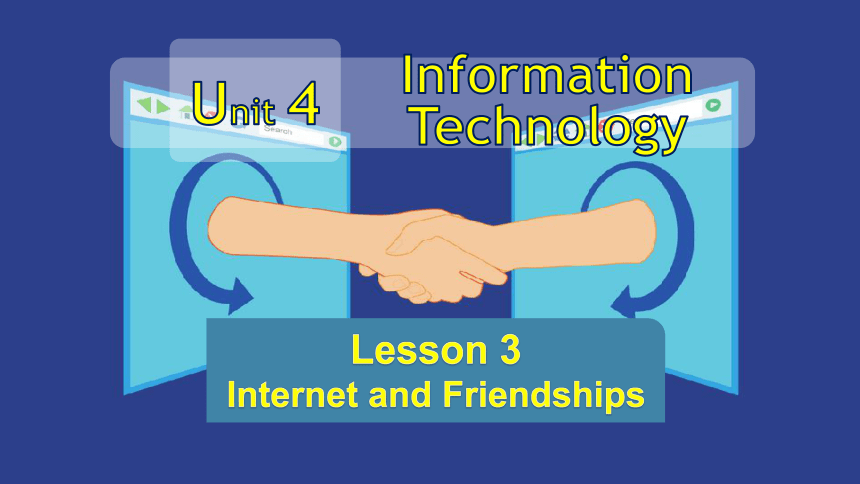 | |
| 格式 | pptx | ||
| 文件大小 | 3.5MB | ||
| 资源类型 | 教案 | ||
| 版本资源 | 北师大版(2019) | ||
| 科目 | 英语 | ||
| 更新时间 | 2022-12-19 21:56:05 | ||
图片预览

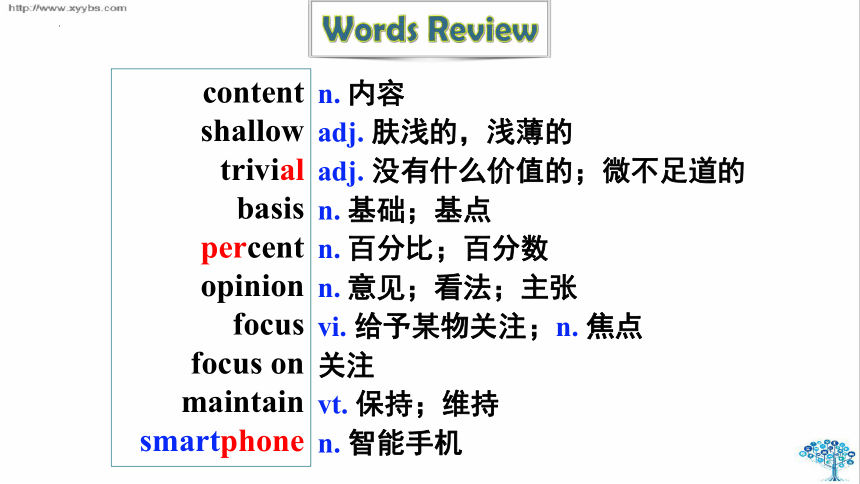

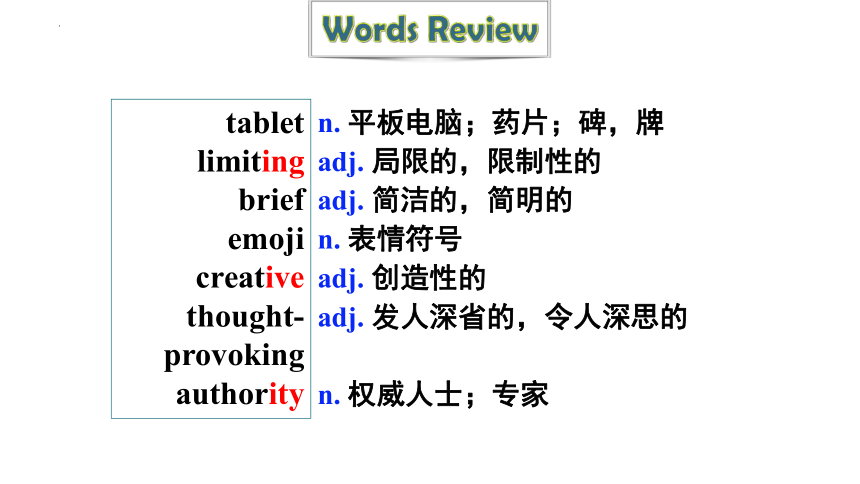
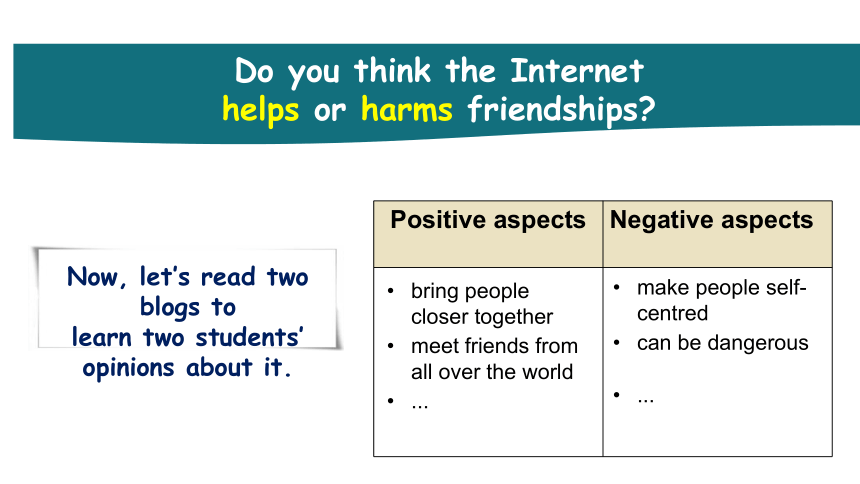

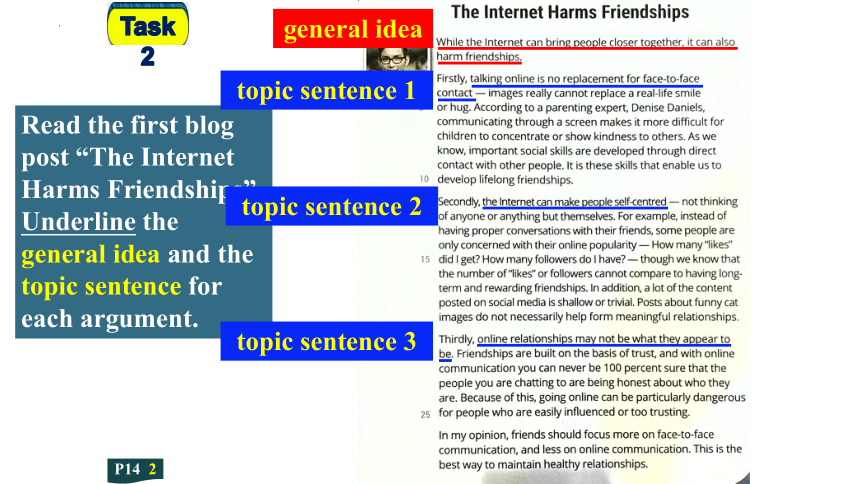
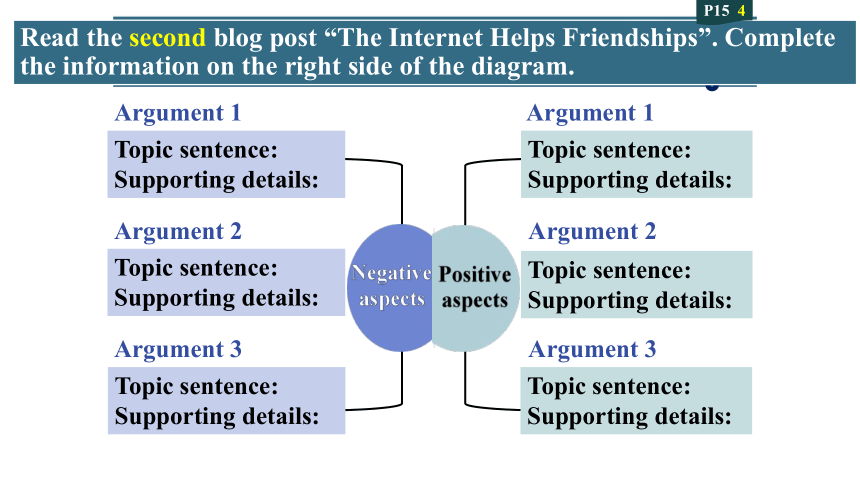
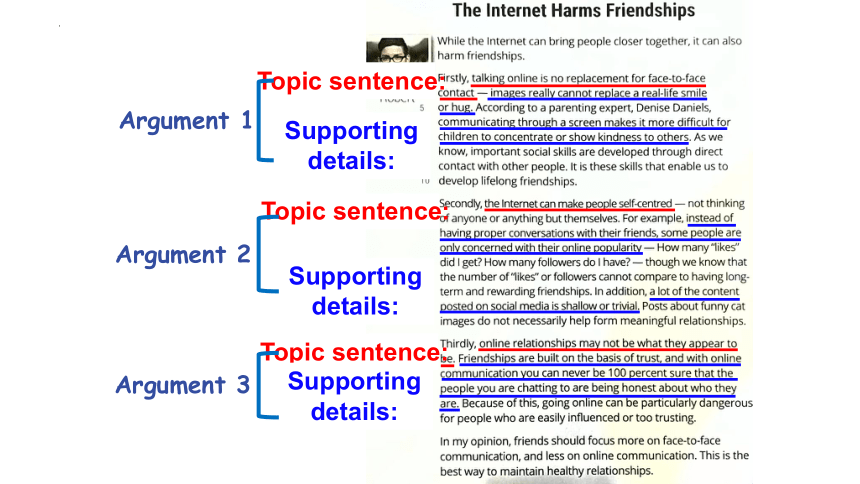
文档简介
(共20张PPT)
Information Technology
Unit 4
Lesson 3
Internet and Friendships
content
shallow
trivial
basis
percent
opinion
focus
focus on
maintain
smartphone
n. 内容
adj. 肤浅的,浅薄的
adj. 没有什么价值的;微不足道的
n. 基础;基点
n. 百分比;百分数
n. 意见;看法;主张
vi. 给予某物关注;n. 焦点
关注
vt. 保持;维持
n. 智能手机
harm
argument
replace
hug
concentrate
concerned
be concerned with
rewarding
addition
in addition
vt.&n. 伤害,损害
n. 论点;论据
vt. 取代;接替
n.&vt. 拥抱;紧抱
vi. 专注,专心;集中注意力
adj. 关切的,关心的
关心……
adj. 有益的;有意义的
n. 增添;添加
除此之外
tablet
limiting
brief
emoji
creative
thought-provoking
authority
n. 平板电脑;药片;碑,牌
adj. 局限的,限制性的
adj. 简洁的,简明的
n. 表情符号
adj. 创造性的
adj. 发人深省的,令人深思的
n. 权威人士;专家
Positive aspects Negative aspects
bring people closer together
meet friends from all over the world
...
make people self-centred
can be dangerous
...
Do you think the Internet
helps or harms friendships
Now, let’s read two blogs to
learn two students’ opinions about it.
Task 1
What is the style of the two blogs
A. Narration (记叙文).
B. Exposition (说明文).
C. Practical writing (应用文).
D. Argumentation (议论文).
An argumentative writing involves the arguments
and the supporting details.
Task 2
P14 2
Read the first blog post “The Internet Harms Friendships”.
Underline the general idea and the topic sentence for each argument.
general idea
topic sentence 1
topic sentence 2
topic sentence 3
Read the first blog post again. Complete the
information on the left side of the diagram.
P14 3
Task 3
Negative
aspects
Topic sentence:
Supporting details:
Argument 1
Topic sentence:
Supporting details:
Argument 2
Topic sentence:
Supporting details:
Argument 3
Positive
aspects
Argument 1
Topic sentence:
Supporting details:
Argument 2
Topic sentence:
Supporting details:
Argument 3
Topic sentence:
Supporting details:
Read the second blog post “The Internet Helps plete the information on the right side of the diagram.
P15 4
Argument 1
Topic sentence:
Supporting details:
Argument 2
Topic sentence:
Supporting details:
Argument 3
Topic sentence:
Supporting details:
Argument 1
Topic
sentence:
Supporting details:
Argument 2
Topic
sentence:
Supporting details:
Argument 3
Topic
sentence:
Supporting details:
1.Look at the sentence from paragraph 2 in the first blog post, “It is these skills that enable us to develop lifelong friendships”. What does “these” refer to Do you agree with the statement Why or why not
Possible Answer: The word “these” refers to social skills, like concentrating or showing kindness to others.
2.In the second blog post, what does Eileen Kennedy-Moore mean when she says that online friends “fill holes real-life friends can't” Give your reasons.
Possible Answer: Online communication is a solution when there are difficulties with face-to-face communication.i.e. people live far apart, a person suffers from social anxiety and may find it easier to talk to people online, etc.
P16 6
Are there any other advantages or disadvantages
of online friendships If so, list them below.
Task 5
Advantages Disadvantages
· People can keep contact with many friends at the same time.
· People get to know more new friends online.
· The message can be saved to read later when people have time, and online friends are more tolerate with delayed reply.
· Some people may feel safer with text-based communication rather than face-to-face communication.
· Other aspects
· Anonymous online friends may be dangerous.
· It is easy to be trapped with too many messages, and it takes time.
· It is not easy to have thought-provoking communication with online friends.
· Other aspects
P16 7
Task 7
Here are five methods writers often use to support their arguments. Read the two blog posts again. Identify what methods the writers used.
Find examples from the text.
P17 8
a. citing ideas from experts or authorities 引用权威
b. giving examples 举例证明
c. using data 使用数据
d. referring to common knowledge 常理判断
e. using comparison and contrast 对比比较
a.
b.
d.
Task 6
a.
d.
e.
a. citing ideas from experts or authorities
引用权威
b. giving examples
举例证明
c. using data 使用数据
d. referring to common knowledge 常理判断
e. using comparison and contrast 对比比较
Complete the adjectives. Choose at least five adjectives to write five sentences in the space given. You may express either positive or negative opinions about the use of the Internet.
Task 7
P17 9
1. r_w_rding
2. s_all_w
3. c_n_e_ient
4. sel_-cen_ _ ed
5. l_mi_ing
6. b_ief
7. c_ea_ive
8. ch_erf_l
9. tr_s_ing
10. th_ _ght-
provoking
e a
h o
o v n
f t r
i t
r
r t
e u
u t
o u
1. ____________________________________
____________________________________
2. ____________________________________
____________________________________
3. ____________________________________
____________________________________
4. ____________________________________
____________________________________
5. ____________________________________
____________________________________
We can find many rewarding things on the Internet.
A lot of the content posted on the Internet is shallow and one-sided(片面的).
Nowadays it is convenient to surf the Internet.
Sometimes, the Internet can make people self-centred.
The Internet provides a creative trading platform.
…
How to write
an argumentation
Body
Conclusion
Argument 1
Argument 2
Argument 3
General idea
Topic sentences
Supporting details
The structure of an argumentation
Does the Internet help or harm friendship Express your opinion by using examples or personal experiences.
It’s beautiful to know that behind every monitor there is a friend that laughs with you, cries with you, is happy with you.
For developping friendships, the Internet is a double-edged sword. We should maintain relationships with friends in a proper way.
Focus on Language
Complete the compound words with a word from the circles. Then use them in the summary below.
Word Builder
Compound Words
1. friend ___________
2. any ___________
3. per ___________
4. web ___________
5. on _________
6. self- _________
7. real-_________
8. smart_________
site
ship
cent
thing
phone
line
centred
life
ship
thing
cent
site
line
centred
life
phone
Focus on Language
Complete the compound words with a word from the circles. Then use them in the summary below.
online
friendship
real-life
smartphone
self-centred
websites
percent
anything
Information Technology
Unit 4
Lesson 3
Internet and Friendships
content
shallow
trivial
basis
percent
opinion
focus
focus on
maintain
smartphone
n. 内容
adj. 肤浅的,浅薄的
adj. 没有什么价值的;微不足道的
n. 基础;基点
n. 百分比;百分数
n. 意见;看法;主张
vi. 给予某物关注;n. 焦点
关注
vt. 保持;维持
n. 智能手机
harm
argument
replace
hug
concentrate
concerned
be concerned with
rewarding
addition
in addition
vt.&n. 伤害,损害
n. 论点;论据
vt. 取代;接替
n.&vt. 拥抱;紧抱
vi. 专注,专心;集中注意力
adj. 关切的,关心的
关心……
adj. 有益的;有意义的
n. 增添;添加
除此之外
tablet
limiting
brief
emoji
creative
thought-provoking
authority
n. 平板电脑;药片;碑,牌
adj. 局限的,限制性的
adj. 简洁的,简明的
n. 表情符号
adj. 创造性的
adj. 发人深省的,令人深思的
n. 权威人士;专家
Positive aspects Negative aspects
bring people closer together
meet friends from all over the world
...
make people self-centred
can be dangerous
...
Do you think the Internet
helps or harms friendships
Now, let’s read two blogs to
learn two students’ opinions about it.
Task 1
What is the style of the two blogs
A. Narration (记叙文).
B. Exposition (说明文).
C. Practical writing (应用文).
D. Argumentation (议论文).
An argumentative writing involves the arguments
and the supporting details.
Task 2
P14 2
Read the first blog post “The Internet Harms Friendships”.
Underline the general idea and the topic sentence for each argument.
general idea
topic sentence 1
topic sentence 2
topic sentence 3
Read the first blog post again. Complete the
information on the left side of the diagram.
P14 3
Task 3
Negative
aspects
Topic sentence:
Supporting details:
Argument 1
Topic sentence:
Supporting details:
Argument 2
Topic sentence:
Supporting details:
Argument 3
Positive
aspects
Argument 1
Topic sentence:
Supporting details:
Argument 2
Topic sentence:
Supporting details:
Argument 3
Topic sentence:
Supporting details:
Read the second blog post “The Internet Helps plete the information on the right side of the diagram.
P15 4
Argument 1
Topic sentence:
Supporting details:
Argument 2
Topic sentence:
Supporting details:
Argument 3
Topic sentence:
Supporting details:
Argument 1
Topic
sentence:
Supporting details:
Argument 2
Topic
sentence:
Supporting details:
Argument 3
Topic
sentence:
Supporting details:
1.Look at the sentence from paragraph 2 in the first blog post, “It is these skills that enable us to develop lifelong friendships”. What does “these” refer to Do you agree with the statement Why or why not
Possible Answer: The word “these” refers to social skills, like concentrating or showing kindness to others.
2.In the second blog post, what does Eileen Kennedy-Moore mean when she says that online friends “fill holes real-life friends can't” Give your reasons.
Possible Answer: Online communication is a solution when there are difficulties with face-to-face communication.i.e. people live far apart, a person suffers from social anxiety and may find it easier to talk to people online, etc.
P16 6
Are there any other advantages or disadvantages
of online friendships If so, list them below.
Task 5
Advantages Disadvantages
· People can keep contact with many friends at the same time.
· People get to know more new friends online.
· The message can be saved to read later when people have time, and online friends are more tolerate with delayed reply.
· Some people may feel safer with text-based communication rather than face-to-face communication.
· Other aspects
· Anonymous online friends may be dangerous.
· It is easy to be trapped with too many messages, and it takes time.
· It is not easy to have thought-provoking communication with online friends.
· Other aspects
P16 7
Task 7
Here are five methods writers often use to support their arguments. Read the two blog posts again. Identify what methods the writers used.
Find examples from the text.
P17 8
a. citing ideas from experts or authorities 引用权威
b. giving examples 举例证明
c. using data 使用数据
d. referring to common knowledge 常理判断
e. using comparison and contrast 对比比较
a.
b.
d.
Task 6
a.
d.
e.
a. citing ideas from experts or authorities
引用权威
b. giving examples
举例证明
c. using data 使用数据
d. referring to common knowledge 常理判断
e. using comparison and contrast 对比比较
Complete the adjectives. Choose at least five adjectives to write five sentences in the space given. You may express either positive or negative opinions about the use of the Internet.
Task 7
P17 9
1. r_w_rding
2. s_all_w
3. c_n_e_ient
4. sel_-cen_ _ ed
5. l_mi_ing
6. b_ief
7. c_ea_ive
8. ch_erf_l
9. tr_s_ing
10. th_ _ght-
provoking
e a
h o
o v n
f t r
i t
r
r t
e u
u t
o u
1. ____________________________________
____________________________________
2. ____________________________________
____________________________________
3. ____________________________________
____________________________________
4. ____________________________________
____________________________________
5. ____________________________________
____________________________________
We can find many rewarding things on the Internet.
A lot of the content posted on the Internet is shallow and one-sided(片面的).
Nowadays it is convenient to surf the Internet.
Sometimes, the Internet can make people self-centred.
The Internet provides a creative trading platform.
…
How to write
an argumentation
Body
Conclusion
Argument 1
Argument 2
Argument 3
General idea
Topic sentences
Supporting details
The structure of an argumentation
Does the Internet help or harm friendship Express your opinion by using examples or personal experiences.
It’s beautiful to know that behind every monitor there is a friend that laughs with you, cries with you, is happy with you.
For developping friendships, the Internet is a double-edged sword. We should maintain relationships with friends in a proper way.
Focus on Language
Complete the compound words with a word from the circles. Then use them in the summary below.
Word Builder
Compound Words
1. friend ___________
2. any ___________
3. per ___________
4. web ___________
5. on _________
6. self- _________
7. real-_________
8. smart_________
site
ship
cent
thing
phone
line
centred
life
ship
thing
cent
site
line
centred
life
phone
Focus on Language
Complete the compound words with a word from the circles. Then use them in the summary below.
online
friendship
real-life
smartphone
self-centred
websites
percent
anything
同课章节目录
- Unit 4 Information technology
- Lesson 1 Avatars
- Lesson 2 Apps
- Lesson 3 Internet and Friendships
- Unit 5 Humans and nature
- Lesson 1 A Sea Story
- Lesson 2 Professional Rescue Team
- Lesson 3 Race to the Pole
- Unit 6 The admirable
- Lesson 1 A Medical Pioneer
- Lesson 2 History Makers
- Lesson 3 The Superhero Behind Superman
